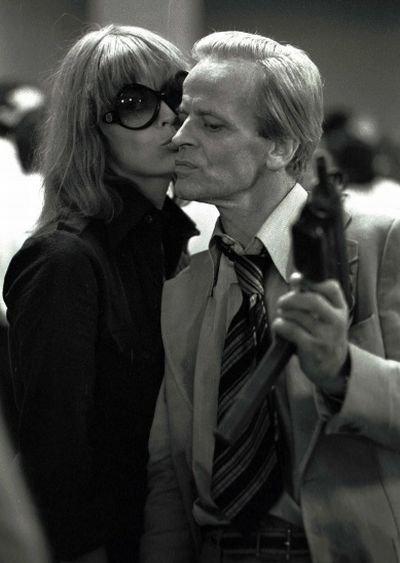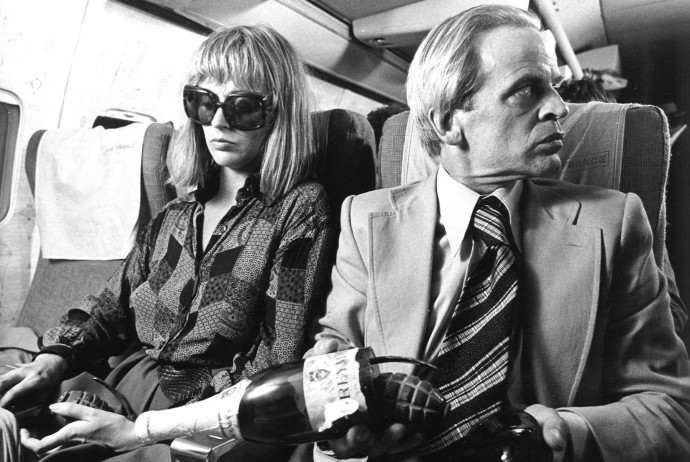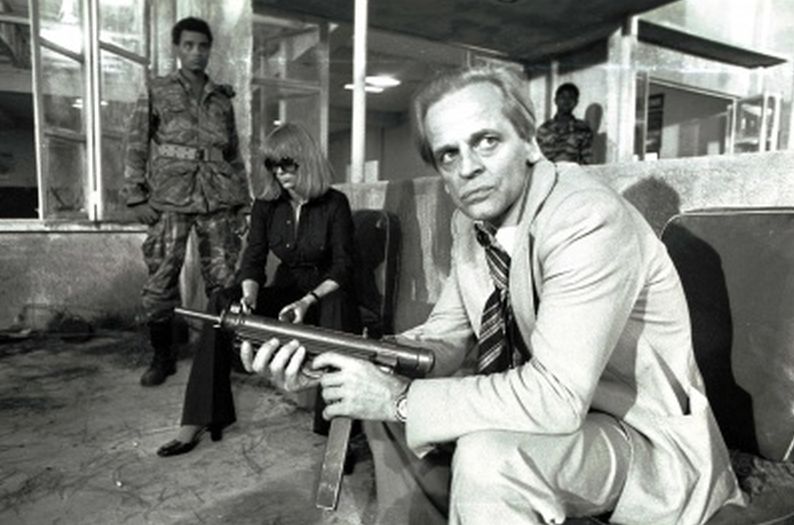Dir: Menahem Golan
Star: Yehoram Gaon, Gila Almagor, Klaus Kinski, Sybil Danning
a.k.a. Operation Thunderbolt
Say what you like about Israel, but I’ve got to admire their approach to terrorism, which more or less redefines “zero tolerance,” in particular since the Munich hostage crisis went pear-shaped in the hands of the German authorities, resulting in the death of all the hostages. The Israelis decided they could rely on no-one else but themselves, and the results have been depicted in a number of movies down the years. For instance, their sending of assassination squads after the architect of Munich was the source for Steven Spielberg’s Munich, and its smaller, arguably superior predecessor, Sword of Gideon. So it is here, with the audacious mission to rescue hostages on a plane hijacked by German terrorists, who are now being held at the Ugandan airport of Entebbe. This inspired both TVM Victory at Entebbe, with Anthony Hopkins, and bigger budget theatrical release Raid on Entebbe, starring Peter Finch. Helmut Berger and Horst Buchholz respectively, played the role which is taken on here by Klaus, that of lead hijacker, Wilfried Böse.
What this brings is a particularly Israeli perspective, emphasizing the pride felt by the country in the accomplishment, and heroic stature conferred on organizer Col. Yonatan Netanyahu (Gaon), whose younger brother Benjamin is the current Prime Minister of the country. The title of the film translates as “Operation Jonathan”, the name by which the mission is known there, in tribute to him, and thirty years later, Netanyahu was voted in the top 20 Israelis of all time by a national poll. It’s hard to think of a parallel in US history. Maybe if the attempt to rescue the hostages in the Iranian embassy has succeeded, instead of (literally) crashing and burning in the desert, it might occupy the same place in national consciousness. Emphasizing this, the film was produced with the co-operation of the Israeli Air Force and government, and includes footage, shot for the movie, of politicians such as then Prime Minister Yitzhak Rabin and Minister of Defense Shimon Peres.
 This may help explain why such a glossy genre piece was submitted as Israel’s entry for the ‘Best Foreign Film’ at the 50th Academy Awards, an honor not usually given to such a… Well, I could use the term “jingoistic piece of cinema,” but let’s go with “straightforward action flicks.” It actually made it as far as the final five nominations, alongside Luis Bunuel’s That Obscure Object of Desire, but both lost out to France’s now largely-forgotten Madame Rosa. [I note that among the other national entries that year were Wim Wenders’ The American Friend and Paul Verhoeven’s Soldier of Orange] There were two versions of the film made: a wholly English-language one for the international market, and the one seen here, which is told in a variety of languages, including English, German, Hebrew and Arabic. Also worth mentioning, two years later director Golan would team up with cousin Yoran Globus to buy Cannon Films, one of the most prolific production companies of the eighties.
This may help explain why such a glossy genre piece was submitted as Israel’s entry for the ‘Best Foreign Film’ at the 50th Academy Awards, an honor not usually given to such a… Well, I could use the term “jingoistic piece of cinema,” but let’s go with “straightforward action flicks.” It actually made it as far as the final five nominations, alongside Luis Bunuel’s That Obscure Object of Desire, but both lost out to France’s now largely-forgotten Madame Rosa. [I note that among the other national entries that year were Wim Wenders’ The American Friend and Paul Verhoeven’s Soldier of Orange] There were two versions of the film made: a wholly English-language one for the international market, and the one seen here, which is told in a variety of languages, including English, German, Hebrew and Arabic. Also worth mentioning, two years later director Golan would team up with cousin Yoran Globus to buy Cannon Films, one of the most prolific production companies of the eighties.
Enough of such trivia. The film is straightforward and linear, beginning with passengers boarding a flight in Tel Aviv, heading for Paris, with a stop in Athens. It’s there, with the laxer Greek security, that the four terrorists, led by Böse and the hardcore Halima (Danning), come on board, and take over the plane shortly after take-off. After landing to refuel in Libya, where the hijackers are warmly welcomed by the local authorities, the plane heads for Uganda and lands at Entebbe Airport on the shores of Lake Victoria. Netanyahu begins planning and training a rescue, but can’t act without government authorization. The passengers are transferred to the airport terminal, and divided into Jewish and gentiles – the latter are let go, but the former are retained as hostages, with demands made for the release of 43 prisoners held by the Israelis. Despite the complexity of staging a rescue such a long way from friendly air-space, with time running out before executions are scheduled to begin, the government finally pulls the trigger, sending Netanyahu and his men on their way, to take on not just the hijackers, but the Ugandan forces guarding the airport.
It’s somewhat amusing to note that Kinski actually represents the saner end of international terrorism, at least in comparison to Halima – this seems to have accurately reflected the dynamic at the time, one hostage recalling, “I thought Bose could be talked to. There was no point talking to the female Nazi terrorist.” So, by Klaus standards, it’s a restrained performance. There’s one point, where he interrogates a hostage who has attempted to hide a knife, that it looks like things might kick off, but attention is rapidly diverted. However, you do still get to experience the delights of Klaus yelling about cutlery: “What are you doing? They all have knives! Why were these people given knives?” He is also out-lunacied by President Amin (Mark Heath), who turns up at the airport, as much to show off his shiny new car as anything else. “I am His Excellency, Field Marshall Dr Idi Amin Dada, owner of the British Cross, DSO, MC, and appointed by God Almighty to be your savior!” I was left with an urge to watch The Last King of Scotland. Or, more salaciously, Rise and Fall of Idi Amin.
The problem with making a movie based on historical events, is that [unless you’re Quentin Tarantino in Inglourious Basterds], those same events hog-tie your narrative. The audience knows how the film ends, so it’s a lot harder to generate tension. Sometimes, you can work around it; for example, on Titanic, James Cameron focused on one particular couple of the thousands on the boat, to great success. But here, that isn’t possible, and so events unfold in the way you know they do. It’s almost like you’re watching a film you’ve already seen. This doesn’t devalue it entirely: it’s a well-made piece, and is certainly a story worth telling. However, I can’t say I was particularly enlightened, though I was approaching it from a Kinskiesque angle, and would have liked to have seen more of Böse’s background. Instead, even his death is a bit unsatisfying, as he just gets shot and keels over. I guess real life doesn’t normally provide a chance for an enlightening final speech, particularly when special forces are attacking you.
Finally, according to Wiki[edia [so take it with a quick “citation needed”!], Danning, who was one of my favorite B-actresses in the nineties, “provided full financing out of Germany and distribution as well as casting her friend Klaus.” She does get a producer credit, but I haven’t been able to find any other information on the friendship between Danning and Kinski, which would seem like a fascinating relationship.

